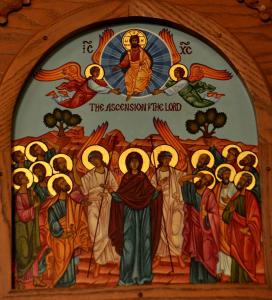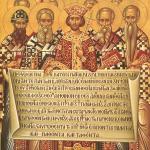
Christ, in himself, gives us God’s ultimate self- revelation; in and through him, in and through his life, we are pointed to the transcendent divine reality in which not creation not only came to be, but in which it continues to exist. This means, even though there are accidental aspects to them, his actions in history brings with them the transcendent eschaton, for the incarnation has made the eschaton immanent, and through that immanentization, capable of being revealed in it. What Jesus does, then, because of its eschatological nature, is not just a historical act, but also, an act in eternity, and because it is an eternal act which has come to us in time, we find that history itself is capable of transcending temporality and being eternalized. There is a paradox involved in this because history, by the nature given to it, by the freedom given to it, entails elements which are not eternal, which are not, therefore, necessary. This is why elements of Jesus’ life, even those most connected to his mission to the world, could have been accomplished in other ways if the people reacted to him differently. That is, the historical events were not necessary in the forms in which they happened. In a sense, the crucifixion was not necessary, even if what it did was necessary: if Jesus had not been taken in and killed that way, Jesus would have given himself to the world, and so saved the world, in another way (how, we can only speculate). With the cross, not only do we have Jesus’s self-sacrifice for the salvation of the world, we are shown God’s extreme love for creation: he was willing to be taken in by humanity, and let humanity do as it wished, letting loose its hatred and violence toward him so that, eschatologically, he could exorcise such demonic passions from humanity. Jesus’s death and resurrection were not the only key events which revealed to us eternal truths. In all that he did, we should be able to discern them, though perhaps the third most important event, one which especially emphasizes the way God has united temporal creation with eternity, is the ascension of Christ:
Now, by assuming possibility he descended from heaven through the human nature in which man was created, and he remained in it as far as immunity from sin, and re-ascended to heaven with all the elected incorporated into himself. [1]
While we can and do acknowledge basic Christological facts, that is, Jesus is a divine person who assumed human nature, and do so without much reflection, the more we ponder the meaning of these facts, the more we will find how wondrous, indeed, how mysterious they are to us. For when we do so, we will begin to find many paradoxes connected to the way Jesus is both divine and human, paradoxes which relate to the way one person is two different, and in some ways opposite, things, at once. He is equal to the Father (due to his divine nature) but he is also less than the Father (due to his humanity). He is God, and so incomprehensible, incapable of being giving a visible image, and yet he is human, and because we can see him, we can depict him with images. He is God, he is eternal, and so unchanging, but he also became human, and with it, took up all that is naturally human, including human changeability. Indeed, how can he, who is unchanging, ever “become” something ?
When we look to Jesus and how he acted in history, we do so based upon his humanity, and yet, because of the hypostatic union, the divinity is always there, always bringing the eschaton to temporal history. His humanity, like all humanity, partakes of history, and so has a history of its own, a history which includes a time before which it was not, and yet, before the incarnation, the person, who is God, was always there, indeed, was there before all history, before time itself. How can he be in history and let us and all creation have their own particular freedom, a freedom which allows humanity to interact with him and treat him as they wished, while he is also eternal, making all such events eternal, and so, seemingly necessary? Therein lies one of the great mysteries of the faith, a mystery which often leads people to overturn the paradox either by embracing some form of fatalism or by undermining the unchangeability of God. Nonetheless, perhaps we can find an answer suggested to us by the ascension – an answer which we can apprehend, so long as we accept that it still an apprehension, not comprehension. Jesus shows us that what is established in time can be and will be taken with him and given a place in the eternal kingdom of God with him. Time has its place, its freedom, and what is made in time is collected up and taken by him and brought to its completion, indeed, perfection, as it is rendered eternal. We will understand this better when we experience the fullness of the eschaton for ourselves, when we experience eternal life, for then we will fully see how time and eternity connect.
The ascension, in some ways, can be seen to as the final accomplishment of the incarnate God-man’s temporal mission. It is the event which, more than others, reveals to us the eschatological fate of the world, though we can and should find eschatological revelations in other parts of the God-man’s history. God became human, entered into time, lived out temporal existence, and through it, brought the eschaton into the world so that the world can be and would be infused with the glory of the kingdom of God. God became human, a part of creation, so as to join together God and creation, eternity and time, and in doing so, reveals the truth that the two are one. The ascension points us beyond temporality, showing us that truly what is made of matter can and does have a place in eternity, and with that place, can and will partake of divine glory.
[1] St. Albert the Great, On the Body of the Lord. Trans. Sr. Albert Marie Surmanski, OP (Washington, DC: CUA Press, 2017), 100.
Stay in touch! Like A Little Bit of Nothing on Facebook.
If you liked what you read, please consider sharing it with your friends and family!
N.B.: While I read comments to moderate them, I rarely respond to them. If I don’t respond to your comment directly, don’t assume I am unthankful for it. I appreciate it. But I want readers to feel free to ask questions, and hopefully, dialogue with each other. I have shared what I wanted to say, though some responses will get a brief reply by me, or, if I find it interesting and something I can engage fully, as the foundation for another post. I have had many posts inspired or improved upon thanks to my readers.













